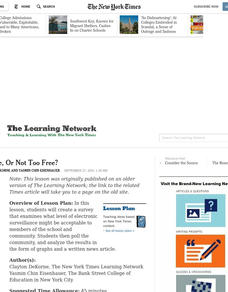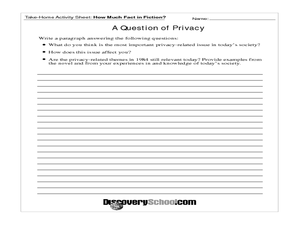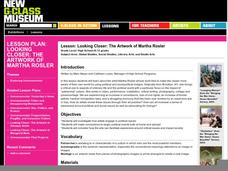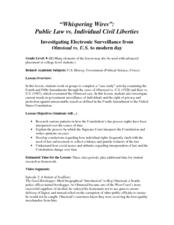Curated OER
Privacy in the Age of Video Surveillance: This Is Not Your Father's Candid Camera
Eighth graders examine the use of video surveillance in the corporate world and other life situations. In groups, they determine how many times and in what situations they believe they are being watched. They use the Constitution to...
Curated OER
Expanding FBI Surveillance Powers After September 11, 2001
High schoolers examine the guidelines put out by the FBI to follow during federal investigations. In groups, they discuss the decision by the FBI to increase surveillance after the terrorist attacks on September 11. They share their...
The New York Times
Where to Draw the Line: Balancing Government Surveillance with the Fourth Amendment
The question of how to balance Fourth Amendment Rights with national security concerns becomes critical in an age of planned terrorist attacks, election interference, and fake news. Get young social scientists involved in the debate with...
Curated OER
Cameras and Crime: A community keeps a lookout
Using a variety of linked sites, students find out what has happened in Collinwood (surveillance cameras installed to help eliminate crime). Students discuss when surveillance cameras could be appropriate, and when they would not be....
Deliberating in a Democracy
Surveillance
Big Brother is always watching you! Scholars analyze the impact security cameras have on the legal system in a democracy. Primary documentation, case studies, and video clips investigate the use of video in prosecution and provide an...
Curated OER
Keeping A Watchful Eye
Learners explore the use of satellite surveillance systems to track criminals. They consider how the use of this technology in law enforcement might affect them and write opinions on whether or not such a system should be adopted by...
Curated OER
Too Free, Or Not Too Free?
Students create a survey that examines what level of electronic surveillance might be acceptable to members of the school and community. They poll the community, and analyze the results in the form of graphs and a written news article.
Curated OER
Immigration and Surveillance
Students investigate the history of surveillance in the United States and its impact on immigration populations via the document Universal Declaration of Human Rights. They view a variety of testimonies and required questionnaires for...
Curated OER
Electronic Surveillance: Unlawful Invasion of Privacy or Justifiable Law Enforcement
Learners state values and analyze them and the values of other students as it relates to the issue of individual privacy. They develop constitutional provisions which address issues relating to privacy with particular reference to item...
The New York Times
Big Brother vs. Little Brother: Updating Orwell's 1984
Government surveillance is an enduring conflict that has become increasingly complex with our nation's use of technology. Add to the understanding of Orwell’s 1984 by using the resources here that display the contemporary actions of Big...
Curated OER
Watch Yourself
Students consider the benefits of CCTV. In this current events lesson, students research the listed Web sites that include information about European efforts to curb antisocial behavior through surveillance. Students discuss the...
Curated OER
Right To Privacy?
Students examine privacy issues. In this global issues lesson, students discuss privacy issues, surveillance cameras, and national identification cards. Students conduct further research about the pros and cons related to American...
Curated OER
Making the Future Present
Students draw and describe a new system for prison surveillance. After reading an article, they discover the use of a wearable computer by prison guards. In groups, they develop a proposal for a new type of technology to be used in a...
Curated OER
1984: How Much Fact in Fiction?
Young scholars compare and contrast the society in Orwell's 1984 with modern society. In this 1984 lesson, students research the historical climate in which Orwell wrote the novel. Young scholars create a comparison chart of privacy...
Curated OER
The Alien and Sedition Acts
Students perform research in the wake of the attacks on the World Trade Center and the Pentagon, a debate has begun over augmented security and surveillance, versus safeguards for personal freedoms. This debate is certain to occupy our...
Curated OER
Is This a Party Issue?
Young scholars identify the differences between the two political parties as they stand on the issue of human rights. In groups, they examine the use of surveillance in the United States and how this can violate someone's human rights. ...
Curated OER
Lesson: Unmonumental: War, Politics, and Protest
Get those upper graders thinking about the world, social conflict, and art as a catalyst for change. They'll uncover the meanings behind four abstract works, intended to spread awareness of the need for social change. Kids are then asked...
Curated OER
Art in Nazi Germany When Art and Politics Didn't Agree
Five lessons display the art created by Germans under the Weimar Republic. The focus of these lessons is to help learners understand the role of art in politics, government censorship, and Nazi tactics. Web links are included.
Curated OER
Lesson: Looking Closer: The Artwork of Martha Rosler
Have a class discussion to better understand the art of Martha Rosler. Young art critics consider Martha's art as it is used to express issues of political unrest and social awareness. They look at each of the five images and use the...
Curated OER
"Whispering Wires": Public Law vs. Individual Civil Liberties
High school student love discussing controversial issues like those brought up in this fourth amendment case study. They examine the 1928 Olmstead vs. U.S. prohibition court case, applying the fourth amendment to determine whether or not...
Curated OER
Parents and Alcohol: Who's To Blame
Students use the internet to read research to find out what other communities are doing to solve the problem of underage drinking. They interview local experts and law enforcement. As a class, they debate the pros and cons of different...
Curated OER
Advanced Critical Reading: Biomimetics
Instruct your class on biomimetics while practicing reading comprehension with this worksheet. Learners read a passage that describes the efforts of scientists, starting with Leonardo da Vinci, to emulate nature to solve issues in...
Curated OER
Banking for Your Future
Learners get a handle on their own personal finances. They discover how banks work, how to plan and stick to a budget, and other helpful tips on managing money. They study the Federal Reserve System, which oversees the nation's banks.
Curated OER
Water, Water Everywhere and Not a Drop to Drink
Young scholars discuss the importance of taking care of their water supply so not only they can use it but generations in the future. In groups, they examine a real pollution scenario in which a sewer overflowed into the ground water....
Other popular searches
- Electronic Surveillance
- Benthic Surveillance
- Government Surveillance
- Bentham Surveillance
- Police Surveillance
- Video Surveillance
- Surveillance Cameras
- Law Enforcement Surveillance
- Lesson on Surveillance
- New York City Surveillance

























